from Apr. 22, 1865
Excerpts from the Letters and diary of Laura M. Towne
-
Full Title
Excerpts from the Letters and diary of Laura M. Towne
-
Description
Laura M. Towne was an abolitionist and an educator. Before the Civil War, Towne was studying medicine but was motivated to become an abolitionist after the outbreak of the Civil War. Towne volunteered when the Union captured Port Royal and other Sea Islands area of South Carolina. She and her friend, Ellen Murray, founded the Penn Center on St. Helena Island, the first school for freed slaves. Her diaries and letters from this time were edited by Rupert Sargent Holland and published in 1912.
-
Transcription
The gardens are gay with jonquils and “daffies,” and the jessamine is nearly in full bloom.
The bell — when will that come? A golden opportunity will be gone if it does not come this week! Our schoolhouse is being shingled now, and if the Government carpenter goes we shall probably have to pay for it, or I shall. It is my affair.
Charleston, S.C., April 14, 1865.
I have seen the same old flag raised on Sumter by General Anderson himself,1 Garrison,2 George Thompson, Tilton, Beecher,3 and a host of abolitionists being present. It was a most beautiful and glorious sight…
Village, St. Helena, S.C., April 23, 1865.
We did go to Charleston to that great celebration, and on the very day that vile assassin was doing his work, or had accomplished it.4 Such shouts and cheers went up for Lincoln from the freed people of Charleston, at the mention of his name by Garrison at the great meeting in Zion Church, that it must have done him good even in his death. I never saw such enthusiasm as they showed every time he was mentioned. On the island here they are inconsolable and will not believe he is dead. In the church this morning they prayed for him as wounded but still alive, and said that he was their Saviour — that Christ saved them from sin, and
1. The United States flag was raised on Fort Sumter in Charleston Harbor on April 14, 1865, by General Robert Anderson, who had been compelled to surrender the same fort four years before.
2. Willian Lloyd Garrison.
3. Henry Ward Beecher.
4. Abraham Lincoln was assassinated April 14, 1865.
----------------------------------
he from “Secesh,” and as for the vile Judas who had lifted his hand against him, they prayed the Lord the whirlwind would carry him away, and that he would melt as wax in the fervent heat, and be driven forever from before the Lord. Was n’t it the cunning of the Devil that did the deed; and they are going to prove him insane! When he was wise enough to strike the one in whom all could trust, and whose death would inevitably throw confusion and doubt into the popular mind of the North! And then to single out Seward2 in hopes that the next Secretary might embroil us with Europe and so give them another chance! It is so hard to wait a week or two before we know what comes next.
But I must tell you of our trip to Charleston. General Saxton gave us all passes, and a large party of teachers went from this island with Mr. Ruggles — good, kind, handsome fellow — to escort us. We stayed at a house kept by the former servants or slaves of Governor Aiken.
I was dreadfully seasick going up, and the day after I got there had to go to bed, and so I missed seeing many things I should have liked to visit. It stood — the house we stayed at —in the very heart of the shelled part of the city, and had ever so many balls through it. The burnt part of the town is the picture of desolation, and the detested “old sugar-house,” as the workhouse was called, looks like a giant in his lair. It was where all the slaves were whipped, and the whipping-room was made with double walls filled in with sand so that the cries could not be heard in the street. The treadmill and all
2 An attempt was also made to assassinate Secretary State Seward.
--------------------------------------------
kinds of tortures were inflicted there. I wanted to make sure of the building and asked an old black woman in that was the old sugar-house. “Dat’s it,” she said, “but it’s all played out now.” On Friday we went to Sumter, got good seats in the amphitheatre inside, near the pavilion for the speakers, and had a good opportunity to see all. I think there was not that enthusiasm in Anderson that I expected, and Henry Ward Beecher addressed himself to the “citizens of Charleston,” when there were not a dozen there. He spoke very much by note, and quite without fire.
At Sumter I bought several photographs, and send you one of the face [of the fortress] farthest from Wagner, Gregg, and our assailing forts, and consequently pretty well preserved. If you look closely you will see rows of basket-work, filled with sand, repairing a break. The whole inside of the fort is lined with them.
The next day was the grand day, however, when Wilson, Garrison, Thompson, Kelly, Tilton, and others spoke. Redpath mentioned John Brown’s name, and asked the great congregation to sing his favorite hymn, “Blow ye the Trumpet,” or “Year of Jubilee.”
I spoke to Judge Kelly afterwards and had a nice promise from him that he would send me all his speeches. We came home on Sunday and found all the missing boxes arrived,— or nearly all,— among them, mine. You do not know how intensely we all enjoy your picture—that exquisite sea-view. How could you spare me such a picture! I lie down on our sofa which faces it, and do so heartily enter into the freshness of it that it is refreshing in this hot weather. Many thanks to you.
------------------------------------------------
[The next letter refers to the death of President Lincoln.]
Saturday, April 29, 1865.
… It was a frightful blow at first. The people have refused to believe he was dead. Last Sunday the black minister of Frogmore said that if they knew the President were dead they would mourn for him, but they could not think that was the truth, and they would wait and see. We are going to-morrow to hear what further they say. One man came for clothing and seemed very indifferent about them — different from most of the people. I expressed some surprise. “Oh,” he said, “I have lost a friend. I don’t care much now about anything.” “What friend?” I asked, not really thinking for a moment. “They call him Sam,” he said; “Uncle Sam, the best friend ever I had.” Another asked me in a whisper if it were true that the “Government was dead.” Rina says she can’t sleep for thinking how sorry she is to lose “Pa Linkum.” You know they call their elders in the church—of the particular one who converted and received them in — their spiritual father, and he has the most absolute power over them. These fathers are addressed with feat and awe as “Pa Marcus,” “Pa Demas,” etc. One man said to me, “Lincoln died for we, Christ died for we, and me believe him de same mans,” that is, they are the same person.
We dressed our school-house in what black we could get, and gave a shred of crape to same of our children, who wear it sacredly. Fanny’s bonnet supplied the whole school.
[Transcription by: Grace C., Dr. Susan Corbesero’s Class, Ellis School, Pittsburgh, Pennsylvania] -
Source
-
Rights
This item is in the public domain and may be reproduced and used for any purpose, including research, teaching, private study, publication, broadcast or commercial use, with proper citation and attribution.
-
Tags
-
Cite this Item
Laura M. Towne. "Excerpts from the Letters and diary of Laura M. Towne". Cambridge, Printed at the Riverside Press,. Remembering Lincoln. Web. Accessed December 14, 2025. https://rememberinglincoln.fords.org/node/1194
-
Creator
Laura M. Towne
-
Publisher
Cambridge, Printed at the Riverside Press,
-
Date
April 22, 1865
from Apr. 22, 1865
Excerpts from the Letters and diary of Laura M. Towne
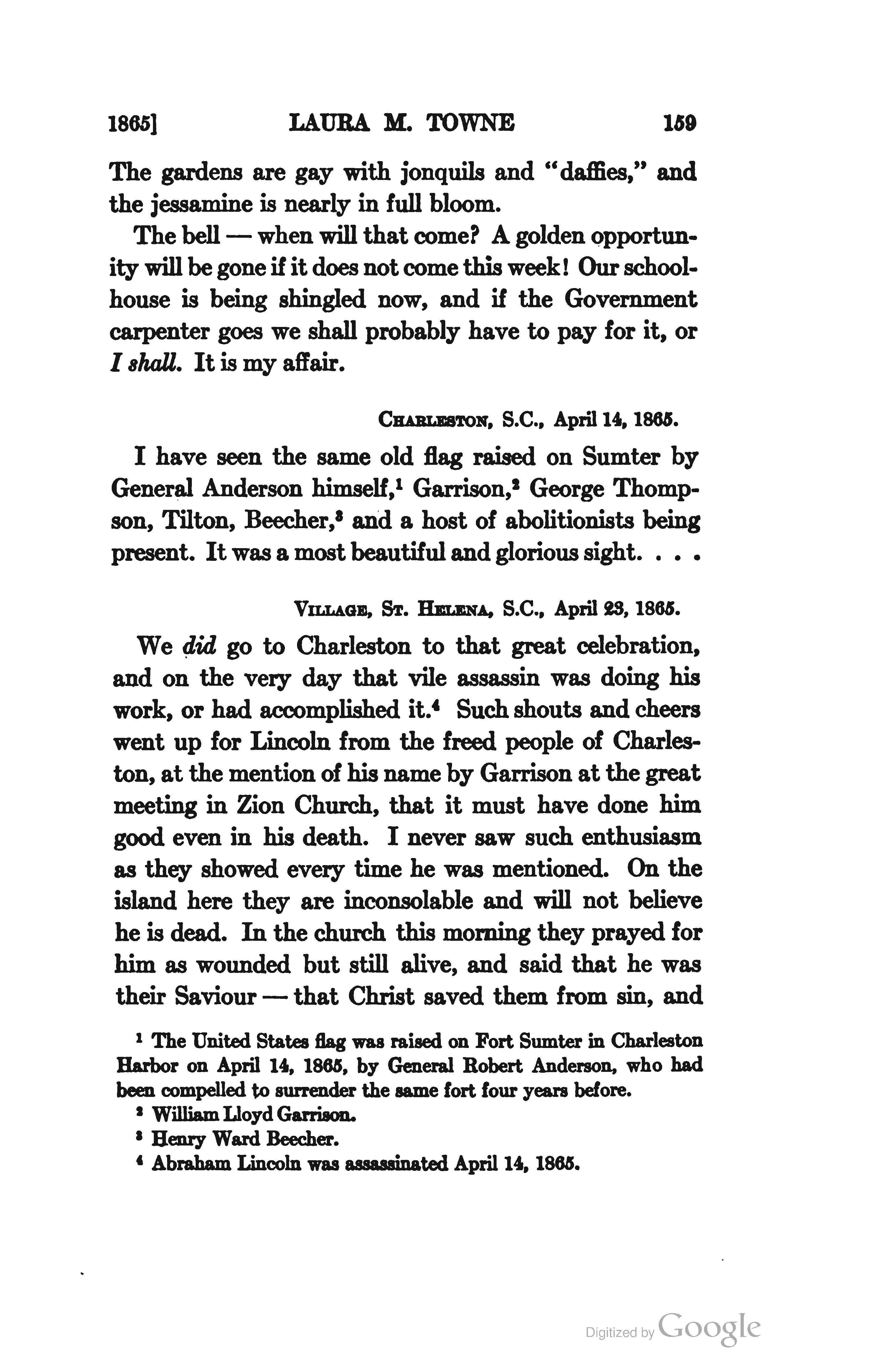
-
Description
Laura M. Towne was an abolitionist and an educator. Before the Civil War, Towne was studying medicine but was motivated to become an abolitionist after the outbreak of the Civil War. Towne volunteered when the Union captured Port Royal and other Sea Islands area of South Carolina. She and her friend, Ellen Murray, founded the Penn Center on St. Helena Island, the first school for freed slaves. Her diaries and letters from this time were edited by Rupert Sargent Holland and published in 1912.
-
Source
-
Rights
This item is in the public domain and may be reproduced and used for any purpose, including research, teaching, private study, publication, broadcast or commercial use, with proper citation and attribution.
-
Creator
Laura M. Towne
-
Publisher
Cambridge, Printed at the Riverside Press,
-
Date
April 22, 1865
from Apr. 25, 1865
Reception of the Remains of Abraham Lincoln
-
Full Title
Reception of the Remains of Abraham Lincoln
-
Description
From the April 25 New York Daily Tribune, describing the reception of Lincoln's Funeral Train and body in different cities on its way to Springfield.
-
Source
Chronicling America: Historic American Newspapers, Library of Congress.
-
Rights
This item is in the public domain and may be reproduced and used for any purpose, including research, teaching, private study, publication, broadcast or commercial use, with proper citation and attribution.
-
Tags
-
Cite this Item
New York Daily Tribune. "Reception of the Remains of Abraham Lincoln". New York Daily Tribune. Remembering Lincoln. Web. Accessed December 14, 2025. https://rememberinglincoln.fords.org/node/1193
-
Creator
New York Daily Tribune
-
Publisher
New York Daily Tribune
-
Date
April 25, 1865
from Apr. 25, 1865
Reception of the Remains of Abraham Lincoln

-
Description
From the April 25 New York Daily Tribune, describing the reception of Lincoln's Funeral Train and body in different cities on its way to Springfield.
-
Source
Chronicling America: Historic American Newspapers, Library of Congress.
-
Rights
This item is in the public domain and may be reproduced and used for any purpose, including research, teaching, private study, publication, broadcast or commercial use, with proper citation and attribution.
-
Creator
New York Daily Tribune
-
Publisher
New York Daily Tribune
-
Date
April 25, 1865
from Apr. 14, 1881
Louisiana's tribute to Abraham Lincoln
-
Full Title
Louisiana's tribute to the memory of Abraham Lincoln, President of the United States : public demonstration in the city of New Orleans, April 22, 1865 ; resolutions, speeches of Christian Roselius and others, etc., etc.
-
Description
Printed in 1881, this book is a complication of reactions to Lincoln's Death from the city of New Orleans.
-
Transcription
[cover:]
Louisiana’s Tribute
To the Memory of
Abraham Lincoln,
President of the United States
Public Demonstration in the City of New Orleans
April 22, 1865
Resolutions, Speeches of Christian Roselius and Others, Etc., Etc.,
Compiled by J. S. Whitaker, Chairman.
New Orleans: Picayune Office Job Print, 66 Camp Street.
1881.
[page 3:]
New Orleans, April 14, 1881
Hon. William E. Shutt, Springfield Ills.:
My Dear Sir, —
When in the summer of 1878, I visited Springfield, one of the chief pleasures I experienced was in passing over places made to certain extent sacred as having been once the home of Abraham Lincoln. You remember how I was struck with the simplicity of his dwelling, and how the recital of many incidents of his noble and unostentatious life as a citizen of Illinois interested me.
With you I finally visited the tomb in your beautiful cemetery, where repose his remains, and while the crypt or chamber in the monument I examined the various records commemorative of the life of our martyred President, and read the eulogiums pronounced upon him in every State and city of this vast nationality he so largely contributed to save.
Among all of these I found no fitting memorial from the State of Louisiana where the news of his terrible taking off by the hands of an assassin produced as much of grief, and of horror, as in any other portion of the Union.
In the following pages taken from “The New Orleans Times,” then conducted by my friend Thomas P. May, Esq., you will find the proceedings by which our people sought to demonstrate our sorrow and their appreciation of our national loss.
By placing these memorials among others in the Monument you will, while conferring a favor on me personally, preserve, what I esteem, an earnest tribute to one of the greatest and noblest characters, that has adorned the annals of our Country
Respectfully, Yours,
J. S. Whitaker
--
We extract the following leading article of the N.O. Times of the morning of 19th, of April, from the pen of Thos. P. May
Assassination of the President and Secretary of State.
The astounding intelligence which it is our painful duty this morning to announce, will paralyze our readers with a sense of unutterable terror, as it must already have paralyzed the mass of the people of the United States. It is difficult to bring the mind to conceive of an atrocity so swift and terrible, unrelenting and devilish. The civilized world will stand shuddering and appalled at the contemplation of so black a deed, and try vainly for words to characterize its utter enormity. The blows struck at President Lincoln and Secretary Seward have gone to the core of the great heart of the nation. The poignant anguish of those fatal wounds penetrate the bosoms of the loyal millions of our country. It seems terrible that the great epoch of a nation’s redemption from a vast and prolonged conspiracy, must needs have been marked by a deed so foul, and a bereavement so afflictive; that the leader of the nation, through its terrible night of civil war, and his chief advisor, must needs have fallen by the hands of assassins before they could witness the fruition of what they have so long, so ardently and ably labored for.
Our heart and hand fail us in the further contemplation of this inexpresibly painful tragedy, for which history furnishes no parallel of enormity.
The country mourns a terrible bereavement. Let us bow in submission to this awful decree of Almighty God, and pray and trust that out of this great affliction good may come to the nation at last.
--
In this Evening’s issue of the Times of the 19th, appeared the following.
The melancholy news of this morning struck every one with horror at the cowardly deed, which has bereaved the Nation of its head and afflicted the people that delighted to do him honor. Seconding the desire of the people the Mayor of the city that once took steps to declare all city business suspended, at the same time that the bells of the city be rung at twelve o’clock, and the official places hung with crape, and such testimonials as would show the sympathy of our people with the Nation in this calamity. The citizens met at Liberty Hall for the purpose of giving expression to their sentiment at this unholy and nefarious deed.
--
Called to Order
Thos. J. Durant arose and stating that the Nation and our people stood aghast at the most appalling crime, suggested the propriety of taking immediate action and nominated Judge Howell, of the Supreme Court, as chairman.
Before taking his seat the Chairman of the meeting confessed that words were inadequate to express his deep horror at this most atrocious and appalling crime. The deepest feelings were those that were inexpressible. The heart of the nation was now throbbing painfully at the misfortune which had befallen the people in the loss of Abraham Lincoln, the President of the United States. He could only hope that in the providence of God, even this calamity might work for good.
The nomination of T.P. May as Secretary of the meeting was accepted unanimously.
--
The Sentiments.
The sentiments of each one of the speakers, of every citizen present, whatever his occupation or his calling, was of the most unfeigned regret as well as horror at the atrocity of the crime. These sentiments were uttered as each one of speakers made suggestions as to the steps which should be taken in the matter. There was no difference of opinion, the only difference being as to the best mode of expressing the feeling of the people.
--
The Results of The Deliberations
After many suggestions as to the place of meeting, after several motions were argued, it was finally concluded that a committee of five be appointed, on whom should devolve all arrangements necessary for the assembly of the citizens on Saturday next. The President appointed on this committee Judge Whitaker, W.T. Gilbert, D. Emely, J.G. Belden, B. Campbell —Judge J.S. Whitaker to act as Chairman.
--
The District Courts Closed
The Judges of the District Courts held a joint session in the rooms of the Second Court, and proposed resolutions concerning the recent calamity. The following is an extract from the minutes of the meeting:
Whereas, The nation is called upon to mourn a great national calamity which has befallen it, in the untimely death of Abraham Lincoln, President of the United States, and William H. Seward, Secretary of State:
Be it resolved, That we, the Judges of the six District Courts of New Orleans, considering it eminently proper as a mark of the high respect and esteem in which the deceased were held, and recognize their many virtues, do adjourn until Monday, the 24th inst.
--
State Offices Ordered to be Closed.
State of Louisiana, Executive Department,
New Orleans, April 19, 1865
owing to the mournful news of the death of the President of the United States and Secretary of State, under circumstances calculated to strike horror to the minds of all good citizens, it is hereby ordered that all offices connected with the State to be closed to-day and to-morrow, the 20th inst.
J. Madison Wells, Governor of Louisiana
--
Action by the First District Court.
At the opening of the First District Court this morning, on motion of the Attorney General, and on suggesting that a telegram announcing the appalling news that two great and illustrious citizens of this Republic—Abraham Lincoln, our honored and immortal President, and our world-renowned Secretary of State, Wm. H. Seward--- have fallen in the plentitude of their fame at the hands of diabolical assassins, on account of the devotion of the said President and Secretary to American liberty and the rights of man, it is ordered, that this court do now adjourn till Thursday (to-morrow) morning, at 10 o’clock, to enable all its officers and employees to take part in the ceremonies of mourning and woe.
--
Action of the Firemen’s Charitable Association.
Fireman’s Charitable Association,
New Orleans, April 19, 1865—12 o’clock
The Fire Department of this city, in view of the sad calamity which has befallen the country in the death of the President of the United States and of the Secretary of State, are requested to suspend the national flag at half-mast from their respective Engine Houses immediately after the publication of this notice.
I.N. Marks, President
Alfred Belanger, Chief Engineer.
--
Action of the Firemen’s Charitable Association
The Firemen’s Charitable Association, as will be noticed by the advertisement, have requested the Fire Department of New Orleans to raise the flag at half-mast over all the Engine Houses, as a mark of sorrow in view of the great national bereavement.
--
The Foreign Consuls
The flags of the offices of the foreign consuls in this city are at half-mast to-day, in appropriate observance of the terrible affliction which has befallen the country.
--
The Customhouse
The various offices of the Customhouse are draped in mourning, and business is suspended
--
The Postoffice
The Postoffice is closed for the day, and preparations are making to drape the exterior of the building in mourning.
--
From the Times of April 20, 1865
The Appearance of the City Yesterday.
The history of New Orleans can furnish few instances of such wide-spread gloom and depression as that exhibited yesterday. The closing of places of business was almost universal, and altogether unprecedented. Considering the short time for preparation, the number of buildings draped with crape was little less than surprising. The display of flags and mourning drapery was too general to admit of particularization. There was scarcely a public office not thus mournfully adorned. Conspicuous among the private residences which were draped were those of Hon. J. Durant and Hon. T. P. May. The Catholic Church on Common Street, and the Charity Hospital, also displayed the emblems of mourning. Col. Saunders & Co., Camp Street, were not behind hand in the general display. The decorations at the National Bank and the United States Treasury Buildings were especially chaste and tasteful.
The public schools were dismissed at an early hour, and thousands of children helped to make up the crowds which thronged the streets.
[transcription by:
Taylor Osborne]
-
Source
Lincoln Financial Foundation Collection via The Internet Archive
-
Rights
This item is in the public domain and may be reproduced and used for any purpose, including research, teaching, private study, publication, broadcast or commercial use, with proper citation and attribution.
-
Tags
-
Cite this Item
J.S. Whitaker. "Louisiana's tribute to the memory of Abraham Lincoln, President of the United States : public demonstration in the city of New Orleans, April 22, 1865 ; resolutions, speeches of Christian Roselius and others, etc., etc.". Picayune Office Job Print. Remembering Lincoln. Web. Accessed December 14, 2025. https://rememberinglincoln.fords.org/node/1192
-
Creator
J.S. Whitaker
-
Publisher
Picayune Office Job Print
-
Date
April 14, 1881
from Apr. 14, 1881
Louisiana's tribute to the memory of Abraham Lincoln, President of the United States : public demonstration in the city of New Orleans, April 22, 1865 ; resolutions, speeches of Christian Roselius and others, etc., etc.
-
Description
Printed in 1881, this book is a complication of reactions to Lincoln's Death from the city of New Orleans.
-
Source
Lincoln Financial Foundation Collection via The Internet Archive
-
Rights
This item is in the public domain and may be reproduced and used for any purpose, including research, teaching, private study, publication, broadcast or commercial use, with proper citation and attribution.
-
Creator
J.S. Whitaker
-
Publisher
Picayune Office Job Print
-
Date
April 14, 1881
from May. 1, 1865
International Expressions of Condolence and Sympathy
-
Full Title
The Assassination of Abraham Lincoln, Late President of the United States of America…Expressions of Condolence and Sympathy Inspired by These Events
-
Description
The U.S. State Department compiled and published a collection of condolences it had received following the Abraham Lincoln's assassination.
-
Source
-
Rights
This item is in the public domain and may be reproduced and used for any purpose, including research, teaching, private study, publication, broadcast or commercial use, with proper citation and attribution.
-
Tags
-
Cite this Item
United States Department of State. "The Assassination of Abraham Lincoln, Late President of the United States of America…Expressions of Condolence and Sympathy Inspired by These Events". U.S. Government Printing Office, . Remembering Lincoln. Web. Accessed December 14, 2025. https://rememberinglincoln.fords.org/node/1191
-
Creator
United States Department of State
-
Publisher
U.S. Government Printing Office,
-
Date
1867
from May. 1, 1865
The Assassination of Abraham Lincoln, Late President of the United States of America…Expressions of Condolence and Sympathy Inspired by These Events
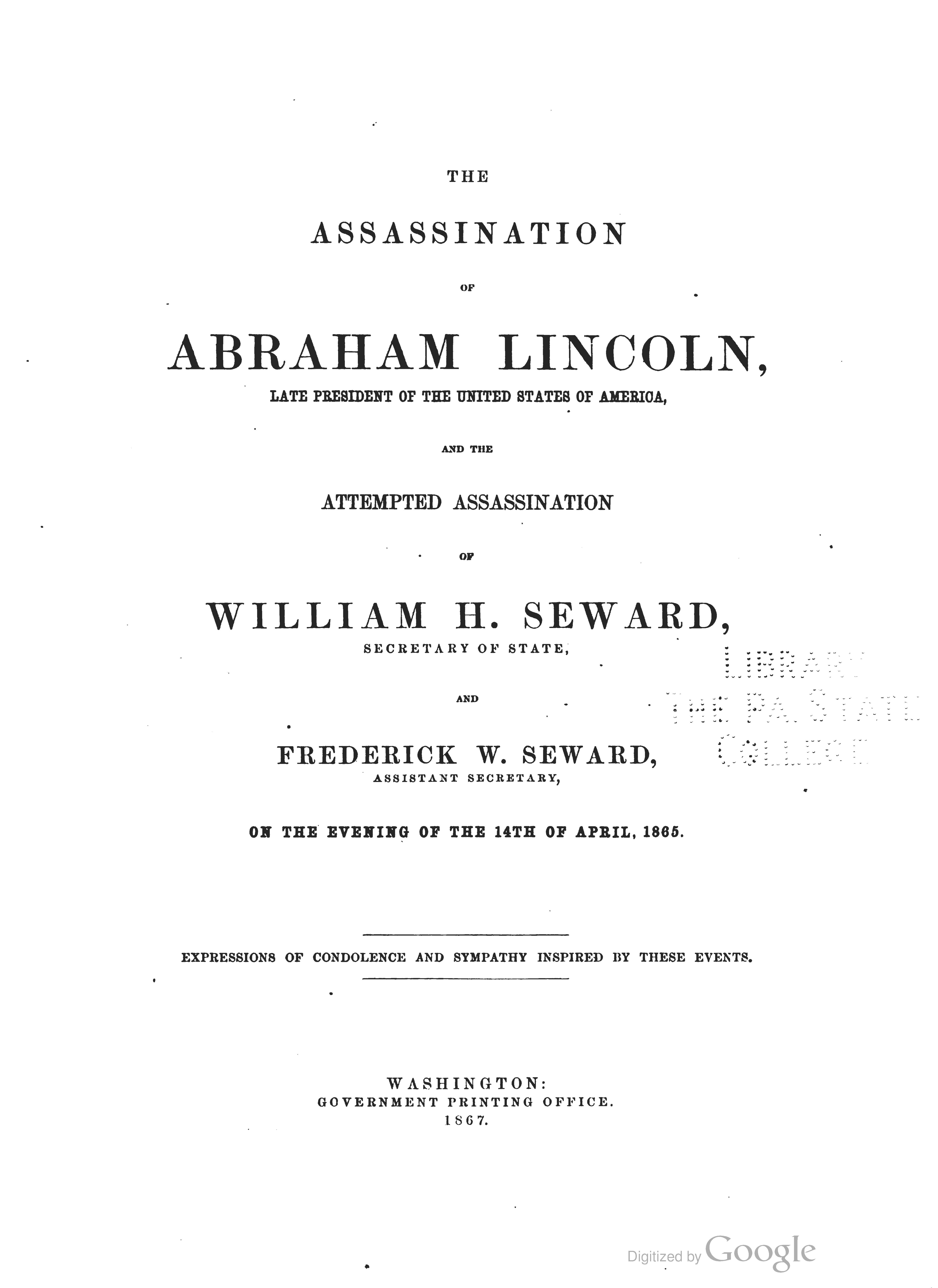
-
Description
The U.S. State Department compiled and published a collection of condolences it had received following the Abraham Lincoln's assassination.
-
Source
-
Rights
This item is in the public domain and may be reproduced and used for any purpose, including research, teaching, private study, publication, broadcast or commercial use, with proper citation and attribution.
-
Creator
United States Department of State
-
Publisher
U.S. Government Printing Office,
-
Date
May 1, 1865
from Jul. 16, 1865
John Bigelow Diary Entry
-
Full Title
John Bigelow Diary Entry
-
Description
John Bigelow was an American author, editor and diplomat. In 186, Abraham Lincoln appointed Bigelow as United States Consul becoming Chargé d'Affaires at Paris, France, as Minister to the Court of Napoleon III. In 1865, he was appointed American Ambassador to France. He sporadically kept a diary during this time and following a months long gap beginning in early April 1865. He returned to writing in July and notes the greatest change over the last few months being the Lincoln assassination.
-
Transcription
“John Bigelow Diary Entry”
Sunday July 16^[[th]]. 1865. 81
It is now the months & more since I have touched my
journal and what an inconsistency on my hart, The
three most eventful months of my life. I have elected
into my [[functions]] [[hae]] as Minister Plen; Prest. Lincoln had
been assassinated ; a man who If me or you [[best guess]] had followed
a dispace to the country , and as Vice Prest. a national ealamily
has becomes President ; this man is now generally
believed to be a much more competent President
for the coming emergencies ; The war is ended and
the rebels are coming in by hundreds to make them
reach with the [[good]]. all satisfied That they had made
a great mistake; Ms. Bigelow has gone home
on a visit with Jenny, I have father Mario [[dfrise`s]] hotel
in the Rue des [[Ballims]] 91°19 at 21000 for a year, hace
ordered [[Bander]] to make me a [[Berfine]] and to repair
my Coupé at an aggregate expense of who boosts, and
last might accepted [[F Asterach]] proportional to find
me a fine than of horses which he says he wil
be glad to do at a bargain out of gratitude.
[Transcription by: Alexis Ennis, Rachel Engl’s class, Lehigh University.] -
Source
Manuscripts and Archives Division, The New York Public Library
-
Rights
This item is in the public domain and may be reproduced and used for any purpose, including research, teaching, private study, publication, broadcast or commercial use, with proper citation and attribution.
-
Tags
-
Cite this Item
John Bigelow. "John Bigelow Diary Entry". Remembering Lincoln. Web. Accessed December 14, 2025. https://rememberinglincoln.fords.org/node/1190
-
Creator
John Bigelow
-
Date
July 16, 1865
from Jul. 16, 1865
John Bigelow Diary Entry
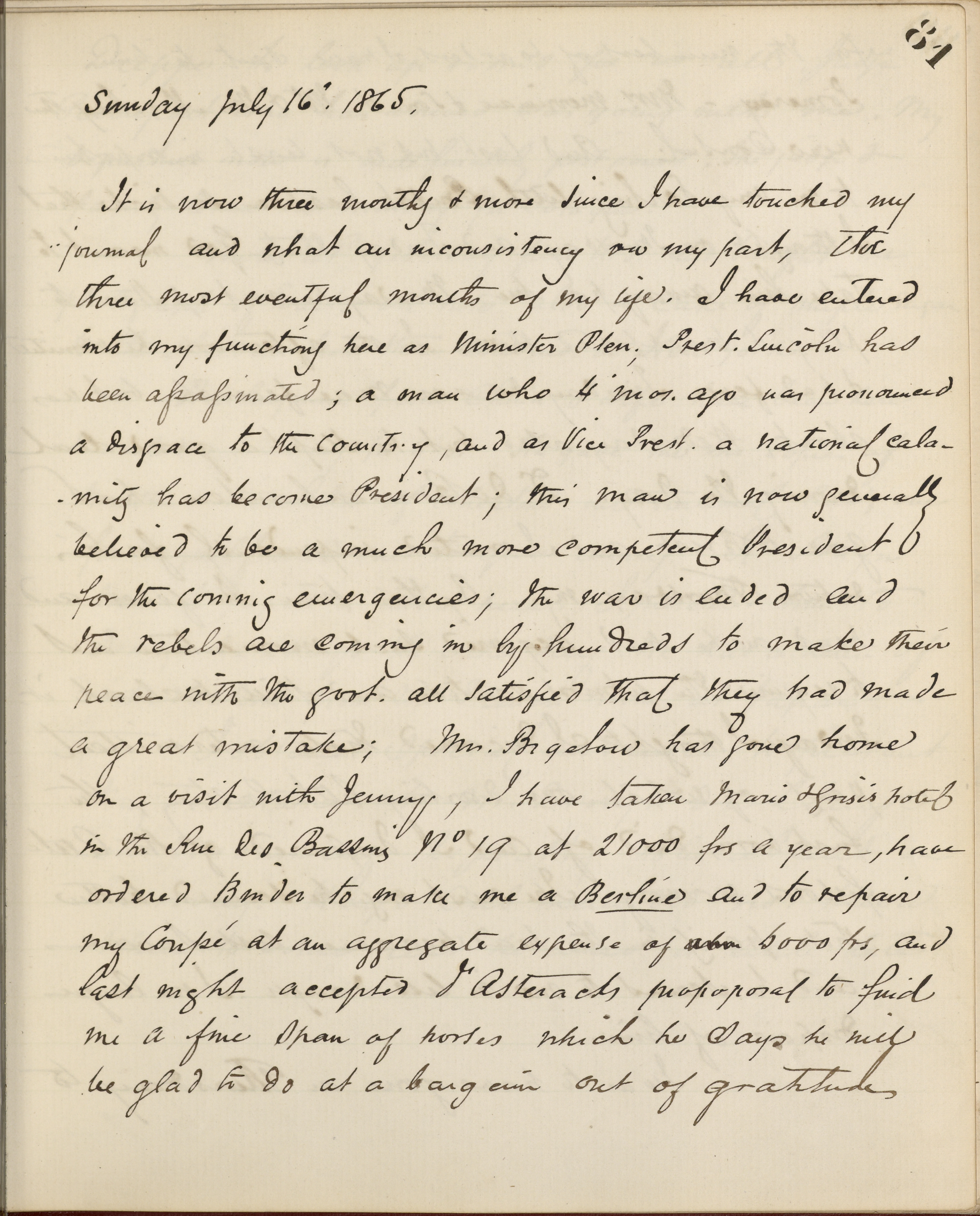
-
Description
John Bigelow was an American author, editor and diplomat. In 186, Abraham Lincoln appointed Bigelow as United States Consul becoming Chargé d'Affaires at Paris, France, as Minister to the Court of Napoleon III. In 1865, he was appointed American Ambassador to France. He sporadically kept a diary during this time and following a months long gap beginning in early April 1865. He returned to writing in July and notes the greatest change over the last few months being the Lincoln assassination.
-
Source
Manuscripts and Archives Division, The New York Public Library
-
Rights
This item is in the public domain and may be reproduced and used for any purpose, including research, teaching, private study, publication, broadcast or commercial use, with proper citation and attribution.
-
Creator
John Bigelow
-
Date
July 16, 1865
from Apr. 15, 1865
Susan B. Anthony's Diary
-
Full Title
Susan B. Anthony's Diary
-
Description
Susan B. Anthony was a women's rights activist and suffragette. Before and during the Civil War, she was also heavily involved in the anti-slavery movement. She wrote about the Lincoln assassination in her diary after she learned of the news on April 15th and over the following days.
-
Source
Library of Congress, Manuscript Division, Susan B. Anthony Papers
-
Rights
This item is in the public domain and may be reproduced and used for any purpose, including research, teaching, private study, publication, broadcast or commercial use, with proper citation and attribution.
-
Tags
-
Cite this Item
Susan B. Anthony. "Susan B. Anthony's Diary". Remembering Lincoln. Web. Accessed December 14, 2025. https://rememberinglincoln.fords.org/node/1189
-
Creator
Susan B. Anthony
-
Date
April 15, 1865
from Apr. 15, 1865
Susan B. Anthony's Diary

-
Description
Susan B. Anthony was a women's rights activist and suffragette. Before and during the Civil War, she was also heavily involved in the anti-slavery movement. She wrote about the Lincoln assassination in her diary after she learned of the news on April 15th and over the following days.
-
Source
Library of Congress, Manuscript Division, Susan B. Anthony Papers
-
Rights
This item is in the public domain and may be reproduced and used for any purpose, including research, teaching, private study, publication, broadcast or commercial use, with proper citation and attribution.
-
Creator
Susan B. Anthony
-
Date
April 15, 1865
from Jun. 1, 1865
Excerpt from The War-time Journal of a Georgia girl, 1864-1865
-
Full Title
Excerpt from The War-time Journal of a Georgia girl, 1864-1865
-
Description
Eliza Frances Andrews was born in Washington, Georgia in 1840. Her father was a prominent judge and planter. While her parents supported the Union, she and her three brothers supported the Confederacy. Her journal begins with her journey to Macon, Georgia in December 1864 to meet relatives with whom she would stay until the War ended. Her journal was heavily edited and published 40 years later. However, it gives insight into Andrews reaction to the Lincoln Assassination and to his memorial on June 1, 1865.
-
Transcription
The War-time Journal of a Georgia girl 1864 dash 1865 by Eliza Frances Andrews
… Secessionists,” he used to call them, when angry or heated By contradiction, but more commonly, “the poor fools,” in a tone of half-pitying rebuke, just as he had spoken of them on that memorable night when the bells were ringing for the secession of his State.
It was probably his warmth in advocating this policy to “agree with the adversary quickly” lest a worse thing should befall us by delay, that led to his action at the public meeting referred to in the text. What was said and done on that occasion, and the substance of the resolutions that gave such offense, I know no more to this day than when the account in the journal was penned. The subject was never alluded to between us and our father. Whether the course of events would have been altered if councils such as his had prevailed, no one can tell. The passion and fury of the time were not favorable to moderation, and the fatal mistake was made, that has petrified the fifteenth amendment in our national constitution comma and injected a race problem into our national life. There it stands to-day, a solid wedge of alien material cleaving the heartwood of our nation's tree of life, and throwing the dead weight of its impenetrable mass on whatever side its own interests or passion, or the influence of designing politicians may direct it.
June 1, Thursday. –I dressed up in my best, intending to celebrate the Yankee fast by going out to pay some call, but I had so many visitors at home that I did not get out till late in the afternoon. I’m sorry enough that Lincoln was assassinated, Heaven knows, but in this public fast is a political scheme gotten up to throw reproach on the South comma and I wouldn't keep it if I were ten times as sorry as I am.
The “righteous Lot” Has come back to town. It is uncertain whether he or Capt. Schaeffer is to reign over us; we hope the latter. He is said to be a very gentlemanly-looking person, and above associating with negroes. his men look cleaner than the other garrison, but Garnett saw one of them with a lady’s gold bracelet on his arm, which shows what they are capable of. I never look at them, but always turn away my head, or pull down my veil when I meet any of them period the streets are so negroes That I don't like to go out when I can help it, though they seem to be behaving better about Washington than in most other places. Capt. Schaeffer does not encourage them in leaving their Masters, still, many of them try to play at freedom, and give themselves airs that are exasperating. The last time I went on the street, two great, strapping wenches forced me off the sidewalk. I could have raised a row by calling for protection from the first Confederate I met, or making complaint at Yankee headquarters, but would not stoop to quarrel with negroes. If the question had to be settled By these Yankees who are in the South comma and see the working of things, I do not believe emancipation would be forced on us in such a hurry; but unfortunately, the government is in the hands of a set of crazy abolitionists, who will make a pretty mess, meddling with things they know nothing about. Some of the Yankee generals have already been converted from their abolition sentiments, and it is said that Wilson is deviled all by out of his life by the negroes in South-West Georgia. In Atlanta, Judge Irvin says he saw the corpses of two dead negroes kicking about the streets unburied, waiting for the public ambulance to come and cart them away.
June 4, Sunday. –Still another batch of Yankees comma and one of them preceded to distinguish himself at once, by “capturing” a negro's watch. They carry out their principles by robbing impartially, without regard to “race, color, or previous condition.” ’Ginny Dick had kept his watch and chain hid ever since the bluecoats put forth this act of philanthropy, and George Palmer's old Maum Betsy said that she has “knowned white folks all her life, an’ some mighty mean ones, but Yankees is de fust ever she seed mean enough to steal fum niggers.” Everybody suspected that mischief was afoot, as soon as the Yankees began coming in such force, and they soon fulfilled expectations by going to the bank and seizing $100,000 in specie belonging to the Virginia banks, which the Confederate calvarymen had restored as soon as they found it was private property. They then arrested the Virginia bank officers, and went about town “pressing” people’s horses to take them to Danburg, to get the “robbers” and the rest of the money, which they say is concealed there. One of the men came to our house after supper, while we were sitting out on…
[Transcription by Quoc T., Ford’s Theatre Society.]
-
Source
Lincoln Financial Foundation Collection via The Internet Archive
-
Rights
This item is in the public domain and may be reproduced and used for any purpose, including research, teaching, private study, publication, broadcast or commercial use, with proper citation and attribution.
-
Tags
-
Cite this Item
Eliza Frances Andrews. "Excerpt from The War-time Journal of a Georgia girl, 1864-1865". New York : D. Appleton and Company. Remembering Lincoln. Web. Accessed December 14, 2025. https://rememberinglincoln.fords.org/node/1188
-
Creator
Eliza Frances Andrews
-
Publisher
New York : D. Appleton and Company
-
Date
June 1, 1865
from Jun. 1, 1865
Excerpt from The War-time Journal of a Georgia girl, 1864-1865
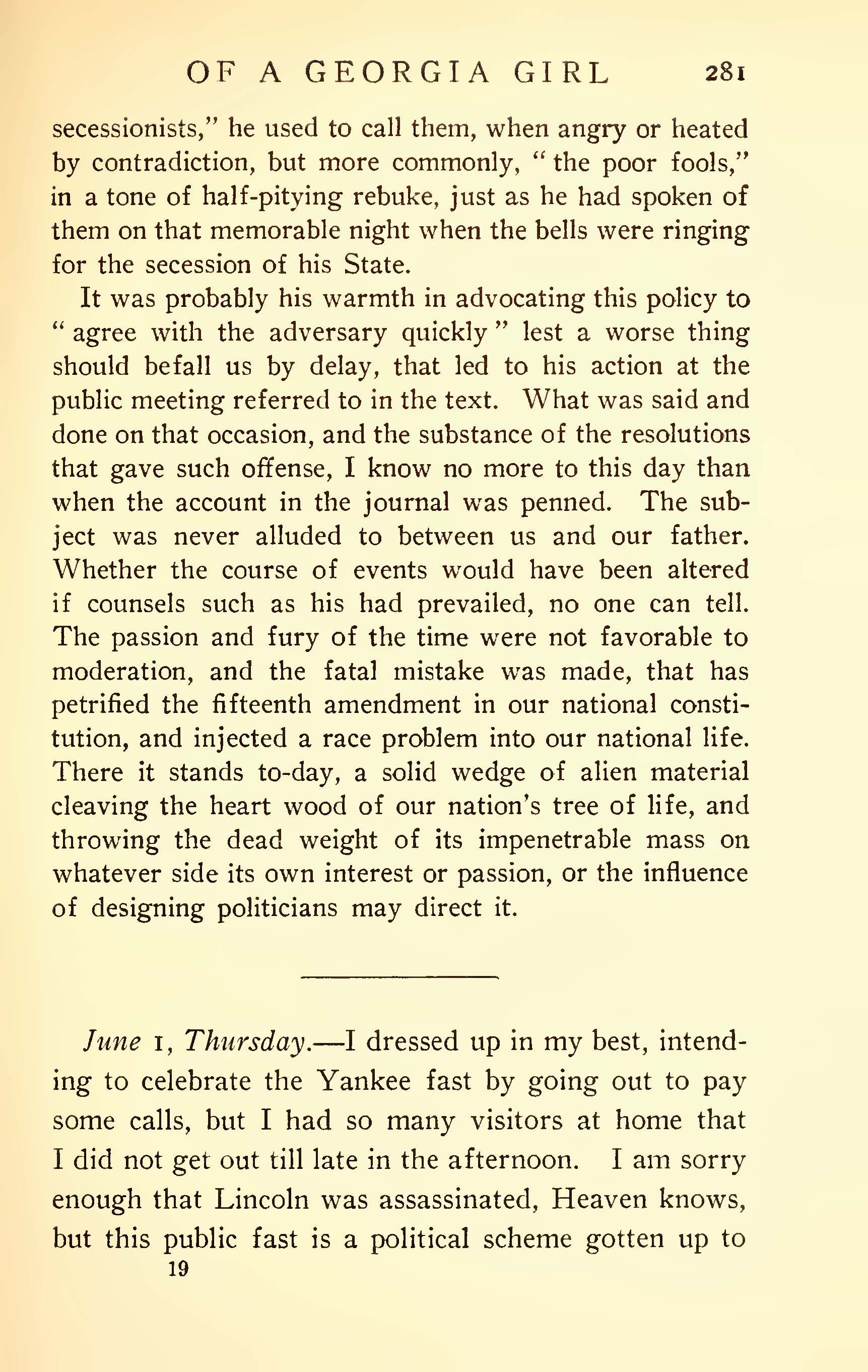
-
Description
Eliza Frances Andrews was born in Washington, Georgia in 1840. Her father was a prominent judge and planter. While her parents supported the Union, she and her three brothers supported the Confederacy. Her journal begins with her journey to Macon, Georgia in December 1864 to meet relatives with whom she would stay until the War ended. Her journal was heavily edited and published 40 years later. However, it gives insight into Andrews reaction to the Lincoln Assassination and to his memorial on June 1, 1865.
-
Source
Lincoln Financial Foundation Collection via The Internet Archive
-
Rights
This item is in the public domain and may be reproduced and used for any purpose, including research, teaching, private study, publication, broadcast or commercial use, with proper citation and attribution.
-
Creator
Eliza Frances Andrews
-
Publisher
New York : D. Appleton and Company
-
Date
June 1, 1865
from May. 1, 1865
O.J. Benham typescript diary
-
Full Title
O.J. Benham typescript diary
-
Description
The typescript copy of O.J. Benham's diary. Benham was a soldier in the Fourth Corps of the Army of the Cumberland. The diary spans February 24, 1865 to June 15, 1865, covering his time in the army. Along with his daily activities, he recorded news and rumors, including the news of the President's Assassination.
-
Source
the Duke University Libraries Digital Collections and the Duke Digital Repository
-
Rights
This item is in the public domain and may be reproduced and used for any purpose, including research, teaching, private study, publication, broadcast or commercial use, with proper citation and attribution.
-
Tags
-
Cite this Item
O.J. Benham. "O.J. Benham typescript diary". Remembering Lincoln. Web. Accessed December 14, 2025. https://rememberinglincoln.fords.org/node/1187
-
Creator
O.J. Benham
-
Date
April 1865
from May. 1, 1865
O.J. Benham typescript diary
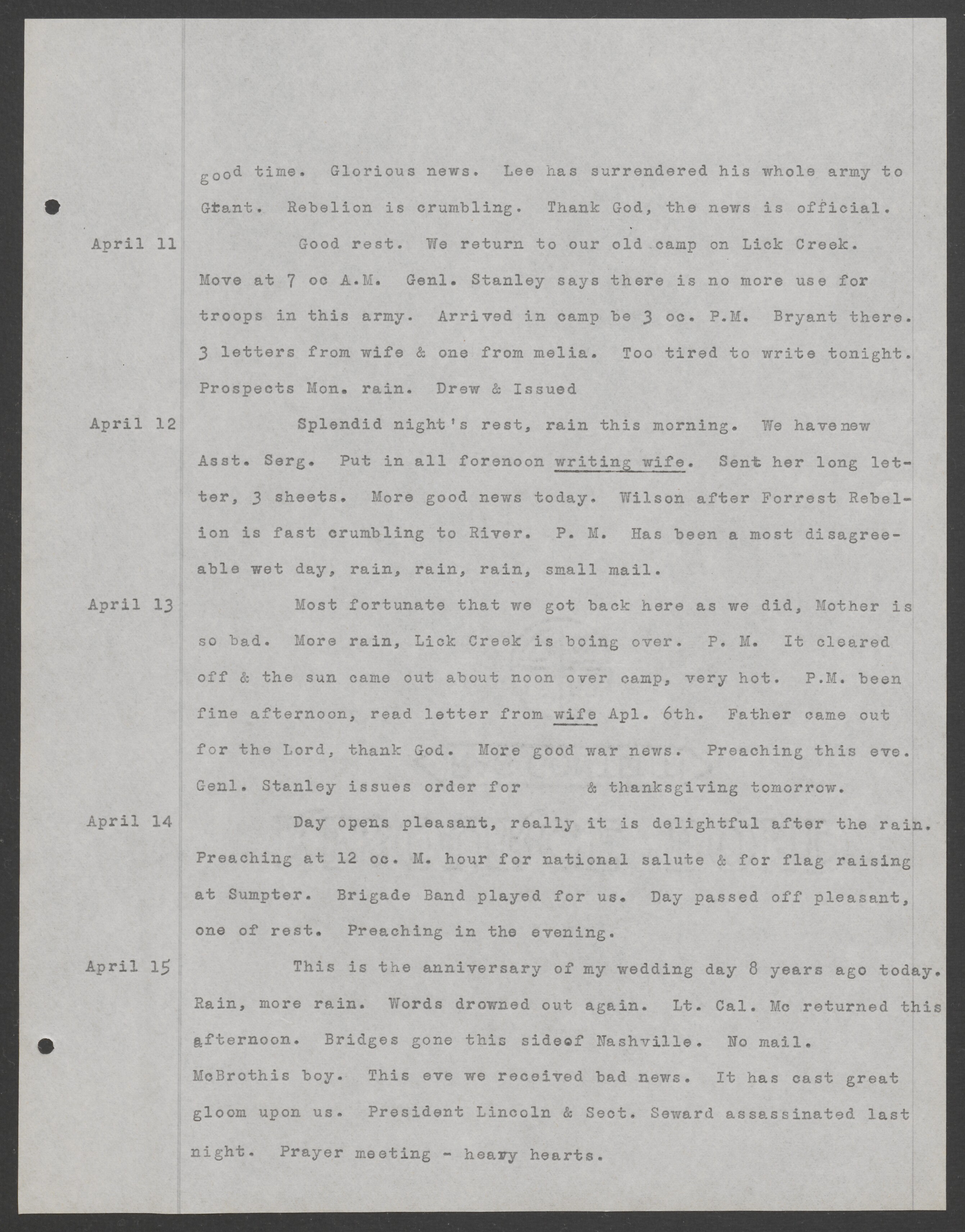
-
Description
The typescript copy of O.J. Benham's diary. Benham was a soldier in the Fourth Corps of the Army of the Cumberland. The diary spans February 24, 1865 to June 15, 1865, covering his time in the army. Along with his daily activities, he recorded news and rumors, including the news of the President's Assassination.
-
Source
the Duke University Libraries Digital Collections and the Duke Digital Repository
-
Rights
This item is in the public domain and may be reproduced and used for any purpose, including research, teaching, private study, publication, broadcast or commercial use, with proper citation and attribution.
-
Creator
O.J. Benham
-
Date
May 1, 1865
from May. 1, 1865
Letters of Jane Grey Swisshelm
-
Full Title
Excerpts from Crusader and feminist; letters of Jane Grey Swisshelm, 1858-1865;
-
Description
Jane Grey Swisshelm a journalist was the editor of the Cloud Visiter [sic] and, afterward, the St. Cloud Democrat. The Minnesota Historical Society collected and compiled the series of articles and letters written for the St. Cloud Democrat, publishing them as a book in 1934. Her letters from late April and early May 1865, express her grief over Lincoln's death and her fear for the country's future.
-
Source
Library of Congress, General Collections and Rare Book and Special Collections Division
-
Rights
This item is in the public domain and may be reproduced and used for any purpose, including research, teaching, private study, publication, broadcast or commercial use, with proper citation and attribution.
-
Tags
-
Cite this Item
Jane Grey Swisshelm. "Excerpts from Crusader and feminist; letters of Jane Grey Swisshelm, 1858-1865;". The Minnesota Historical Society. Remembering Lincoln. Web. Accessed December 14, 2025. https://rememberinglincoln.fords.org/node/1186
-
Creator
Jane Grey Swisshelm
-
Publisher
The Minnesota Historical Society
-
Date
April-May 1865
from May. 1, 1865
Excerpts from Crusader and feminist; letters of Jane Grey Swisshelm, 1858-1865;
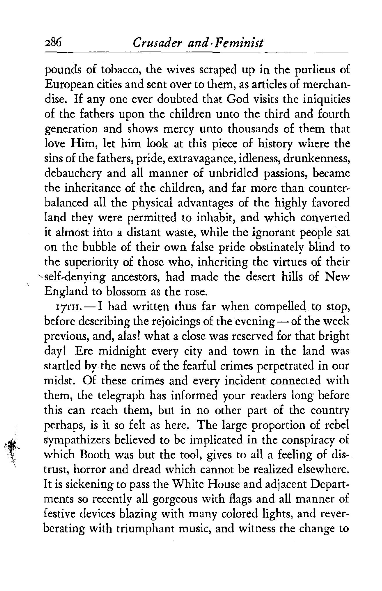
-
Description
Jane Grey Swisshelm a journalist was the editor of the Cloud Visiter [sic] and, afterward, the St. Cloud Democrat. The Minnesota Historical Society collected and compiled the series of articles and letters written for the St. Cloud Democrat, publishing them as a book in 1934. Her letters from late April and early May 1865, express her grief over Lincoln's death and her fear for the country's future.
-
Source
Library of Congress, General Collections and Rare Book and Special Collections Division
-
Rights
This item is in the public domain and may be reproduced and used for any purpose, including research, teaching, private study, publication, broadcast or commercial use, with proper citation and attribution.
-
Creator
Jane Grey Swisshelm
-
Publisher
The Minnesota Historical Society
-
Date
May 1, 1865
from May. 1, 1865
Journal of Elon Lee
-
Full Title
Journal of Elon Lee
-
Description
Elon Lee was a student at the Old University of Chicago in the 1860s. Lee wrote extensively in his journal and to his family about the Lincoln assassination and funeral, which he attended in Chicago
-
Source
Special Collections Research Center, University of Chicago Library
-
Rights
This item is in the public domain and may be reproduced and used for any purpose, including research, teaching, private study, publication, broadcast or commercial use, with proper citation and attribution.
-
Tags
-
Cite this Item
Elon Lee. "Journal of Elon Lee". Remembering Lincoln. Web. Accessed December 14, 2025. https://rememberinglincoln.fords.org/node/1185
-
Creator
Elon Lee
-
Date
April-May 1865
from May. 1, 1865
Journal of Elon Lee
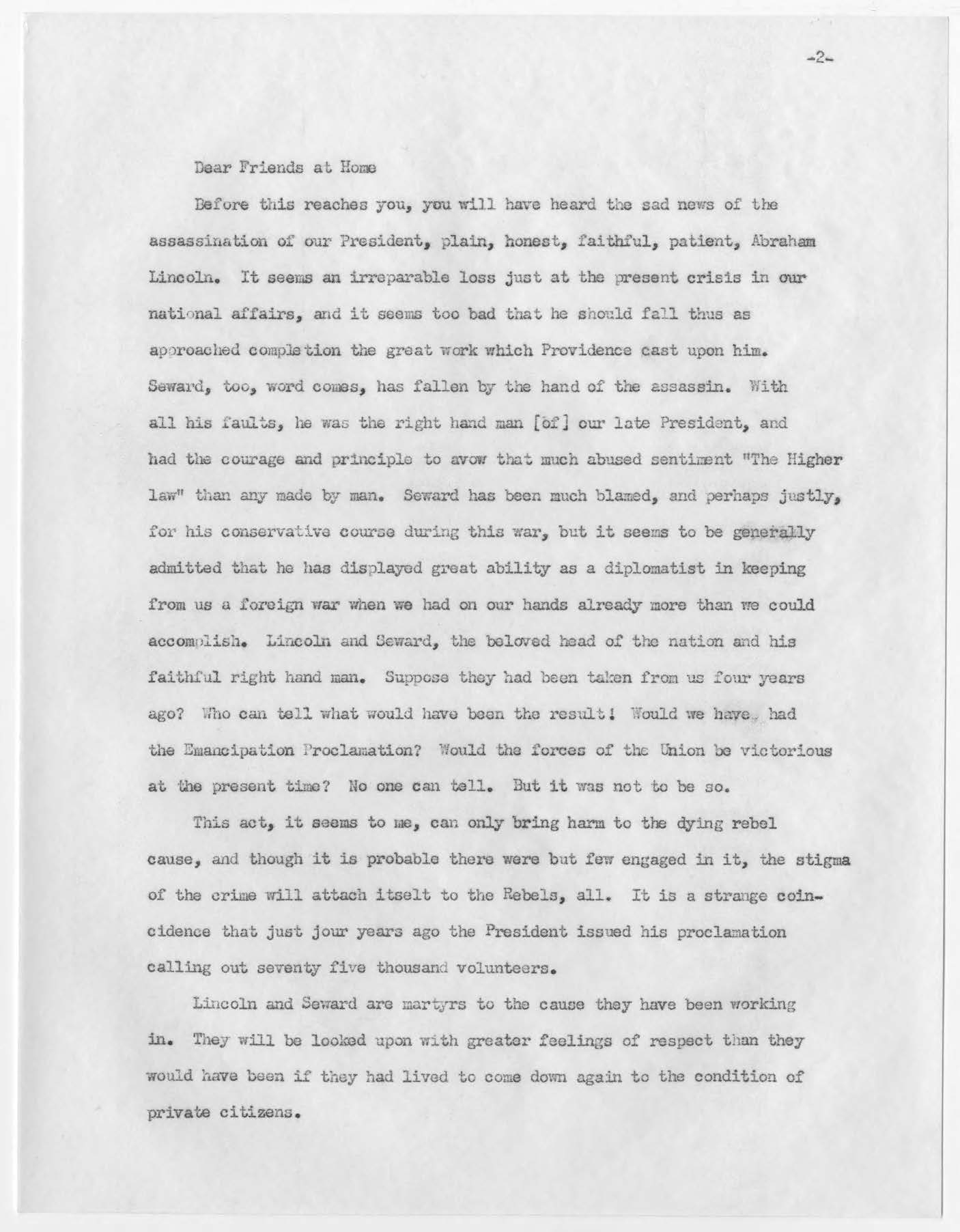
-
Description
Elon Lee was a student at the Old University of Chicago in the 1860s. Lee wrote extensively in his journal and to his family about the Lincoln assassination and funeral, which he attended in Chicago
-
Source
Special Collections Research Center, University of Chicago Library
-
Rights
This item is in the public domain and may be reproduced and used for any purpose, including research, teaching, private study, publication, broadcast or commercial use, with proper citation and attribution.
-
Creator
Elon Lee
-
Date
May 1, 1865